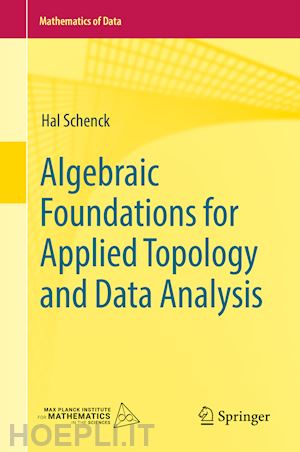
Questo prodotto usufruisce delle SPEDIZIONI GRATIS
selezionando l'opzione Corriere Veloce in fase di ordine.
Pagabile anche con Carta della cultura giovani e del merito, 18App Bonus Cultura e Carta del Docente
This book gives an intuitive and hands-on introduction to Topological Data Analysis (TDA). Covering a wide range of topics at levels of sophistication varying from elementary (matrix algebra) to esoteric (Grothendieck spectral sequence), it offers a mirror of data science aimed at a general mathematical audience.
The required algebraic background is developed in detail. The first third of the book reviews several core areas of mathematics, beginning with basic linear algebra and applications to data fitting and web search algorithms, followed by quick primers on algebra and topology. The middle third introduces algebraic topology, along with applications to sensor networks and voter ranking. The last third covers key contemporary tools in TDA: persistent and multiparameter persistent homology. Also included is a user’s guide to derived functors and spectral sequences (useful but somewhat technical tools which have recently found applications in TDA), and an appendix illustrating a number of software packages used in the field.
Based on a course given as part of a masters degree in statistics, the book is appropriate for graduate students.
Hal Schenck received a BS in Applied Math and Computer Science from Carnegie-Mellon University in 1986. From 1986 to 1990 he served as an Army officer in Georgia and Germany, then returned to graduate school at Cornell, earning his Ph.D. in 1997. After an NSF postdoc at Harvard and Northeastern, he was a professor at Texas A&M (2001–2007), at the University of Illinois (2007–2017), and Chair at Iowa State (2017–2019). Since 2019 he has been the Rosemary Kopel Brown Eminent Scholars Chair at Auburn University.
He has earned teaching awards from Cornell and Illinois, and awards for departmental leadership and outreach to student veterans from Iowa State. In 2014 he was a Professor at Universidad de Buenos Aires as a Fulbright fellow, and in 2020 he was named a fellow of the AMS. His research is at the interface of algebra, geometry, and computation.











Il sito utilizza cookie ed altri strumenti di tracciamento che raccolgono informazioni dal dispositivo dell’utente. Oltre ai cookie tecnici ed analitici aggregati, strettamente necessari per il funzionamento di questo sito web, previo consenso dell’utente possono essere installati cookie di profilazione e marketing e cookie dei social media. Cliccando su “Accetto tutti i cookie” saranno attivate tutte le categorie di cookie. Per accettare solo deterninate categorie di cookie, cliccare invece su “Impostazioni cookie”. Chiudendo il banner o continuando a navigare saranno installati solo cookie tecnici. Per maggiori dettagli, consultare la Cookie Policy.